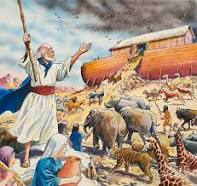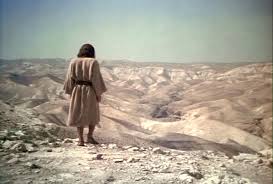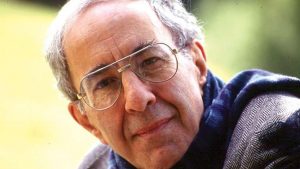Living Good News
(Genesis 9:8-15; Psalm 25; 1 Peter 3:18-22; Mark 1:12-15 )
**********************************************************

Two movies speak to the readings today. The first, most obviously, would be Noah, which more or less literally portrays how Noah and his family are snatched out of a wicked world to hopefully begin anew, almost against Noah’s own worldview. The second is Hunger Games – The Mocking Jay, featuring Jennifer Lawrence, which touches on the archetypal themes of good versus an oppressive evil, only in this movie, the non-ending implies that evil triumphs over good, as we hear the words “There is no more District 12.”

Today’s liturgy invites us not just to believe that good triumphs over evil, but to live the Good News of a new life through faith and repentance.
Both the first reading from Genesis and 1st Peter in the second reading build on the story of Noah. In the first reading, God makes a covenant relationship with Noah and his family of seven. They were to live with God in a new way, on a renewed earth. Interestingly, that covenant was made with all the animals and all of creation – a reminder that the original “bible” or revelation was the book of creation itself. Richard Rohr calls this the first religion or “awe-ism.” The sign of this covenant would be a rainbow and the promise that there would never be another flood.
St. Peter in the second reading builds on this reading. The people of Noah’s day refused to believe, he states. That is the same sin as the Pharisees and religious leaders of Jesus’ day, who refused to believe in him as Son of God. Their unbelief led to his innocent death for our sins; his descent into hell or Hades to bring salvation to the justified people of the Old Testament, and to open up for us a new way of life that would be initiated not by a flood, but by the waters of baptism. The proof and the pledge of this is not a rainbow, but the resurrection of Jesus which fulfilled all the prophecies of the Old Testament and vindicated all of Jesus’ teachings in the New Testament.
Then we come to the Gospel that is all about Jesus, the faithful one, the New Israel, who like the old Israel, was tested in the desert. Luke tells us that the Spirit drove Jesus there – it was something he simply had to do to be the new faithful Israel.

It is interesting and critical for us that the temptations of Jesus were to deny his humanity. Jesus was tempted to be super-human, to be above suffering, or to be sub-human, to give in to his basest instincts. To give in to money, possessions, pleasure and power as the goal of life, would be to go with his basest instincts, to let himself down, to degrade himself, to be less than human. To not allow himself to feel pain, to think that he was better than others, would have been to denigrate his humanity, to use his divinity in a selfish way. In the end, Jesus was faithful to his call to show us what a fully human life would look like. He did not deny his humanity.
The expression “forty days” is not meant to be taken literally. Biblically, that number means “the time that it takes to bring something to completion, to fullness.” Jesus stayed in the desert until Satan had exhausted his efforts to tempt him to betray who he was, the divine Son of God, by using his divine power in a selfish way, and of course, Satan was unsuccessful – Jesus stayed true to his relationship with God and to his humanity.
Having proven himself to be the New Israel, the faithful Son of God by both his baptism and the temptations in the desert, Jesus went up to Galilee after John was arrested. Galilee in the gospels, unlike Jerusalem, symbolizes the time in Jesus’ ministry when all went well, when he was accepted by the people, when he performed miracles, healed the sick, raised the dead, preached and taught throughout the region.
His message is key to living in the reign of God: repent and believe. We are to put our total and complete trust in him as the Son of God, the New Israel who alone can give us that new life that the flood could only symbolize. We are to believe in him who is the true victor over evil. That is why the Gospel is good news, or evangelion in Greek. Warriors who were victorious in war used to send messengers ahead of them to announce the good news, evangelion, of their victory in battle. Well, this is the true good news about the real victor in battle, Jesus the new Josuah, who brings his people into the promised land of a new life with God, free from sin and darkness.
We are also to repent. In Greek the word is metanoia, which means “putting on a higher mind.” It is the opposite of paranoia which means to have a “divided mind,” to be of two minds, to be confused and without direction. To repent means to change our whole way of being, to let go of any sin and darkness in our lives, to be the best person that we can possibly be, to put on our highest mind.
This is truly good news, and an invitation to us to experience this good news, this new way of life, through faith and repentance and being fully human. The late Henri Nouwen, a renowned spiritual writer, was a good example of someone who understood what it means to be fully human. He would rewrite and rewrite his books until he was sure that even young people could understand them. He also struggled with his humanity, his weakness, his perfectionism in transparent ways. He even left the world of the university to live in one of the L’Arche homes for the handicapped so that he could learn more about being fully human through the simple community life with those who have no pretence in them.

Henri Nouwen
The Eucharist that we share now is a living out of our baptism, a renewal of our covenant with God through the Body and Blood of Jesus, an act of repentance, and a deep act of faith. It is also a celebration of the Kingdom of God in our midst.
May our celebration deepen our faith, enhance our repentance, and help us to live out the third luminous mystery of the rosary – the call to conversion and to proclaim the Good News.




Bishop, thanks for detailed information and message about learning this Good News which is reconcile, repent and believe . The third Luminous mystery is proclaiming the Kingdom. “The kingdom of heaven is at hand . Heal the sick, raise the dead , cleans lepers, cast out demons. You received without pay, give without pay.” (Mt 10: 7-8). I have the prayer to the rosary. We should repent and trust in God to experience this Good News. Blessings!
I admire with your homilies , messages you are presenting to people everyday . You are such a teacher with many advices and lessons. Keep it up. Many Blessings !